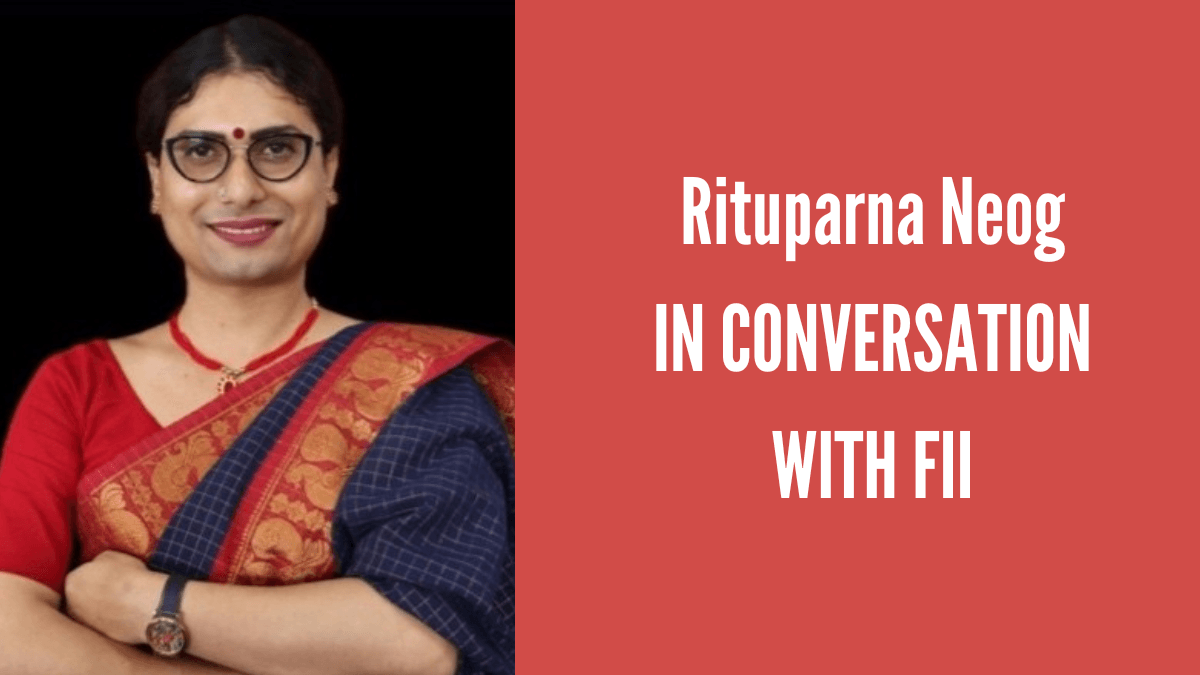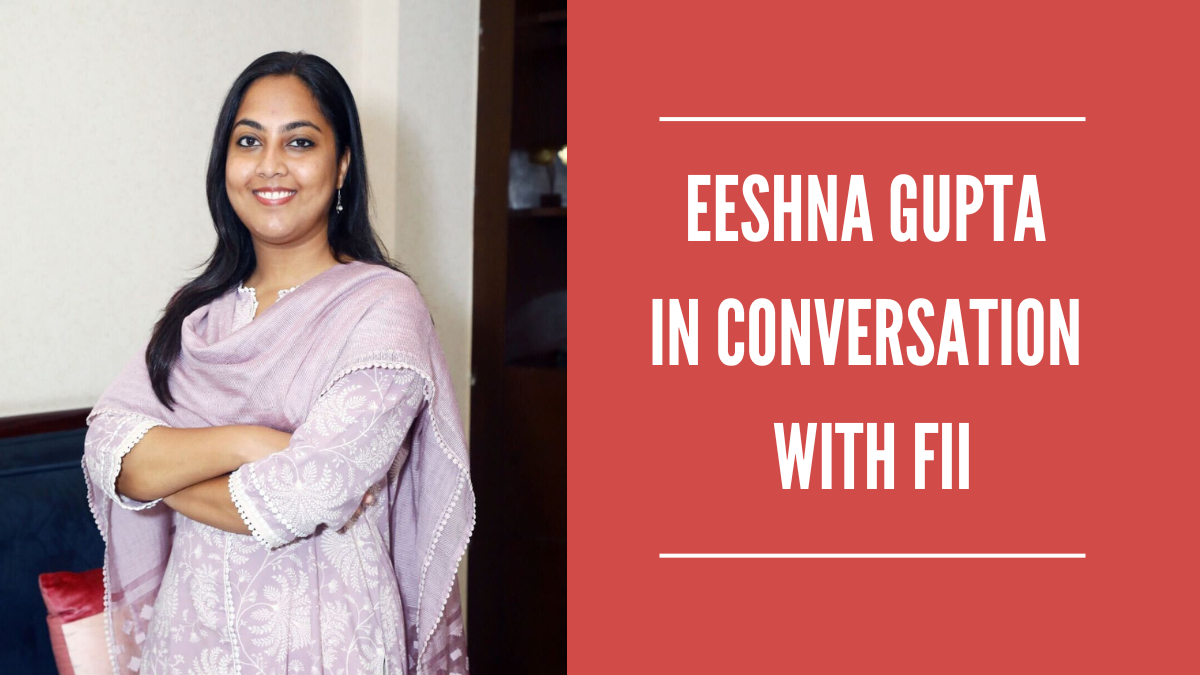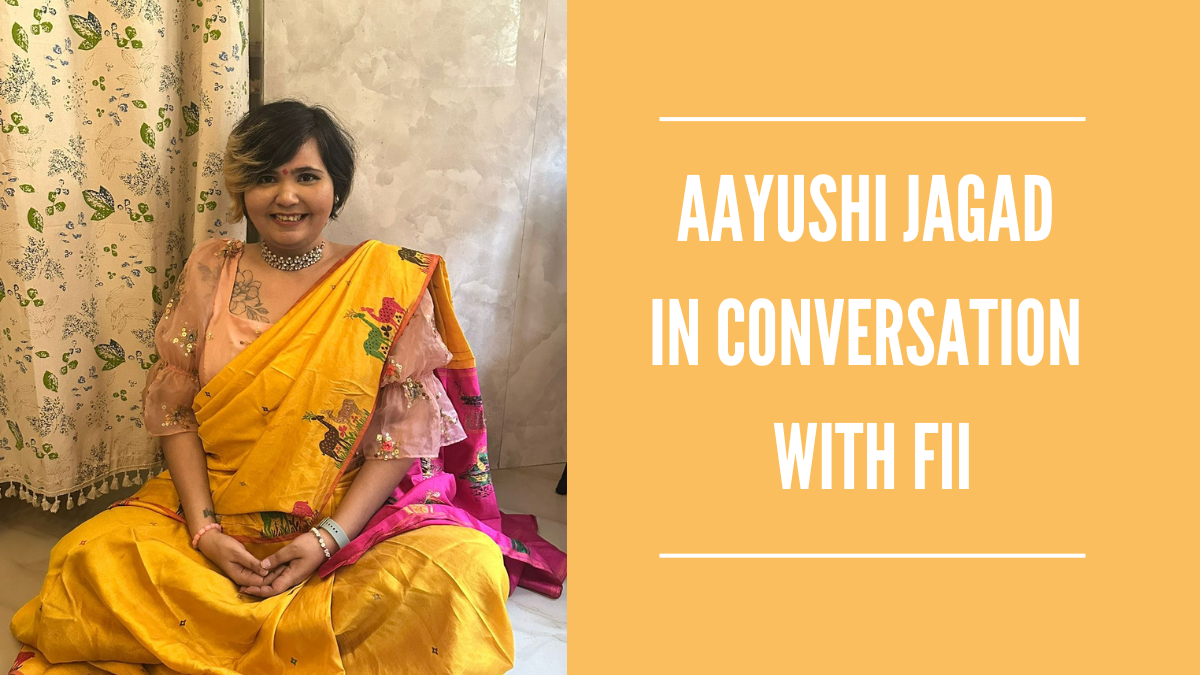Founder of Akam Foundation, Rituparna Neog (They/She) is a transgender rights activist and a library educator from Assam. Through their foundation, they advance the feminist mission of ensuring gender justice and equality. They are a member of the National Council for Transgender Persons, Government of India and the Associate Vice Chairperson for the State Transgender Welfare Board of Assam.
In a conversation with FII, Neog shares their inspiration behind Akam and some of the challenges the queer movement faces in Assam.
FII: Tell us about the beginning of Akam Foundation and your vision behind it.
Rituparna Neog: Akam Foundation is based on my initiative project Kitape Kotha Koi community library. I started the library in 2021. Then I began the queer mobilisation in rural Assam. When both initiatives were running simultaneously, I decided to register the organisation in 2022. My organisation’s work for gender justice and free libraries for all aligns with my passion and interests. Both these works are personally tied to me because as a transgender person, working for gender justice is very important to me.
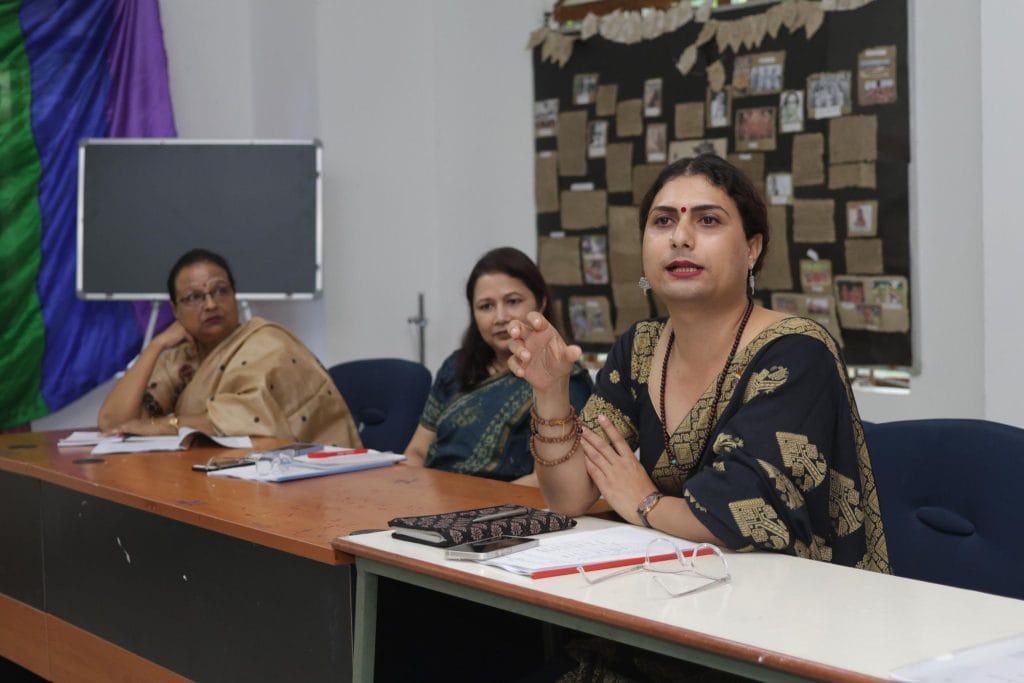
Reading has empowered me as a trans person. I am standing where I am today only because of reading. Reading gave me that takat (power) to think rationally. It allowed me to articulate, ask the right questions and take a stand for myself. This is how both the free library and gender justice work together to form the base of the Akam Foundation.
FII: You mentioned your free library initiative and building a free community library is integral to your Foundation’s goals. How do you think it helps the larger queer movement?
Rituparna Neog: Where I am sitting right now as we converse is the Chandraprabha Saikiani Feminist Library and Resource Centre in Dibrugarh. The whole idea behind it is that whatever social action we undertake for gender justice has to come from a library. Because libraries make us think, and when we can think, we can articulate: we can envision change. If we learn about democratic values – the collective power of people from books — it can lead to social change. This is why our work on gender justice is based on the Chandraprabha Saikiani Feminist Library and Resource Centre. We utilise the library to organise any meetings, events or mobilisation drives.
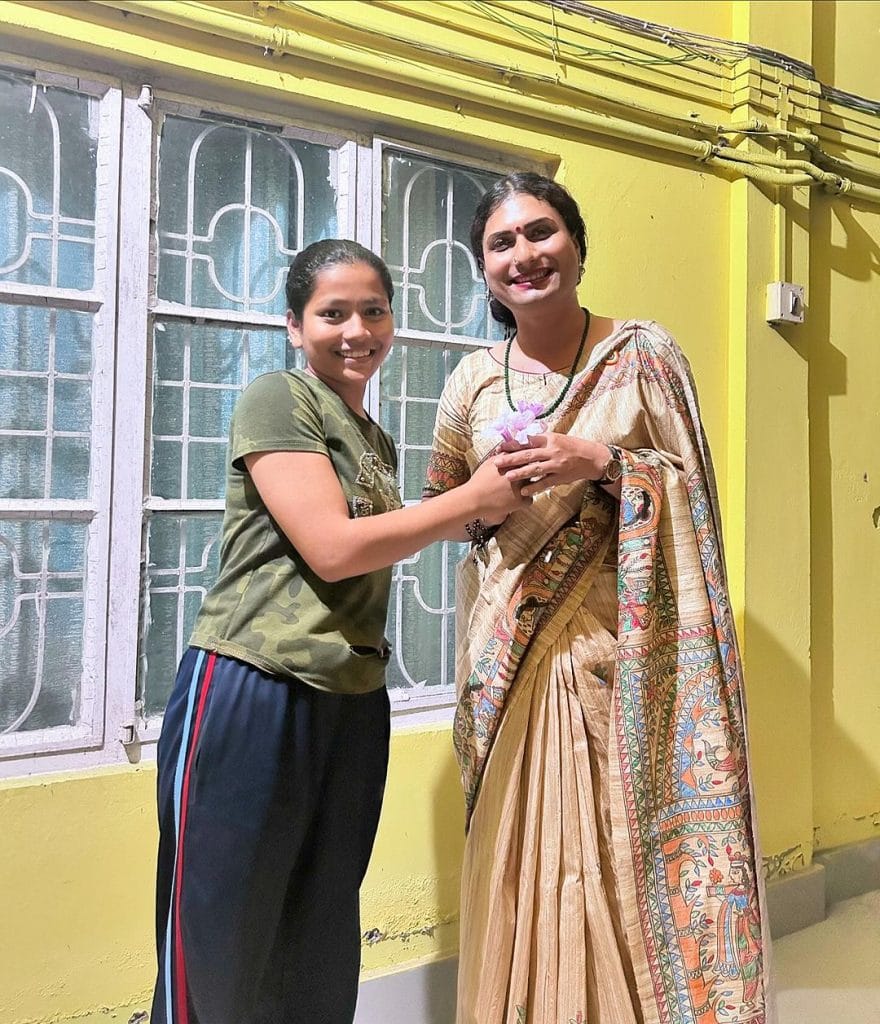
Library is also a place that melts people, as in, books humble people. And it is also one of my strategies to engage the larger community while working for gender justice. I see library as the melting pot where the queer community, the allies and others can come together, sit, think and converse with each other. It is from this point we can hope to achieve visibility and acceptance.
Library is a place that melts people, as in, books humble people.
Library is a place that melts people, as in, books humble people. And it is also one of my strategies to engage the larger community while working for gender justice. I see the library as the melting pot where the queer community, the allies and others can come together, sit, think and converse with each other. It is from this point we can hope to achieve visibility and acceptance.
FII: The queer movement in India mostly centres around cities and urban spaces. What inspired you to focus on rural Assam?
Rituparna Neog: Because I am from rural Assam! I grew up in a village, my family is still there, and I still visit and live there. Although my base is now Dibrugarh and Guwahati, when I started working it was Guwahati, and for two years I worked in Majuli. As I travelled to various villages around Assam, I began to notice that my community is lonely in the villages, in the sense that nobody reaches out to them because the mobilisation remains concentrated in Guwahati. I told everyone around me that our movement had to go beyond, and nobody was doing anything. Probably I was also expecting other people to do it.
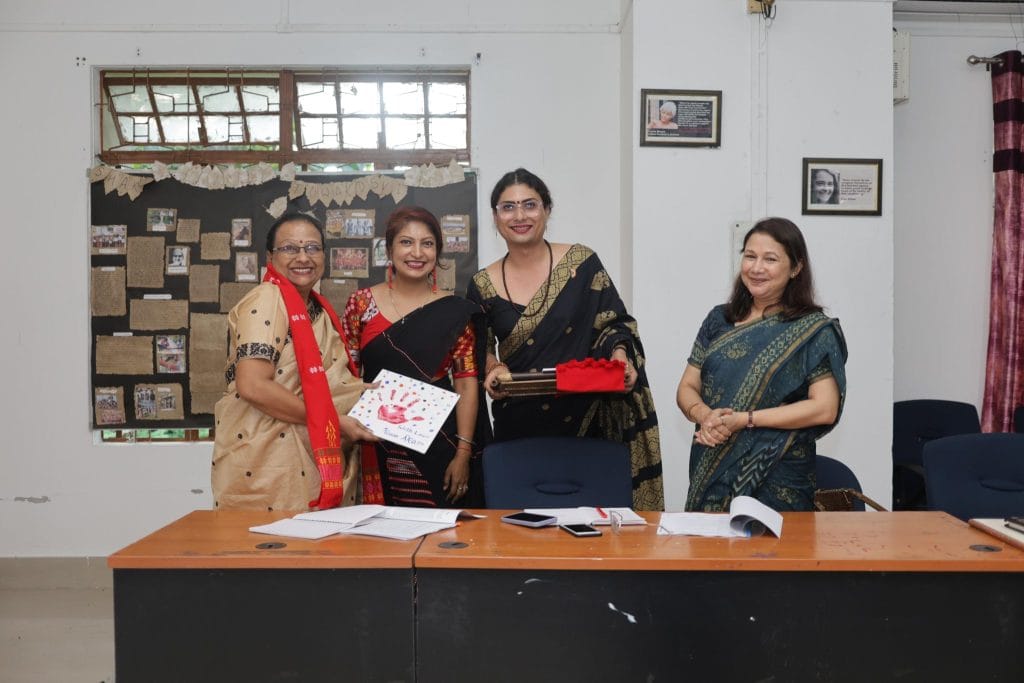
When I realised nobody was willing to take the responsibility, I asked myself, “Why should you wait for others? Why don’t you do it? You know the ground reality because you come from a village.” This is why I started mobilising my community in rural Assam and small towns — places like Jorhat, Dibrugarh, Tinsukia, Sibsagar, and Morigaon.
Recently I was in Karbi Anglong which is a small hilly district and you would be surprised to know about the kind of acceptance that I experienced. I was roaming around in Diphu till half past nine at night– I was not uncomfortable, I did not feel unsafe. I experienced so much love there.
People from our community do exist in villages. We must break the stereotypical idea that “yeh sab toh bahar ke ideas hai” (these are foreign ideas). We are very much here. For example, I am very much Axomiya, I am very much gaonor (from a village), I am very much from Jorhat – a small town, and I am queer, I am trans and I am real. These identities have to be acknowledged and these narratives have to be dwelled upon.
FII: As a northeastern transgender activist, what do you think are the major shortcomings or challenges specific to the queer rights movement in the Northeast?
Rituparna Neog: One challenge is that we are geographically marginalised. We do not have access to the kind of resources available to people from, for instance, Delhi, Mumbai or Bangalore. We do not have big funders who support our work, so there is a lack of resources. Also, there is a lack of space. For example, if you are working in Delhi, there are a lot of civil service organisations, university spaces and other youth spaces from which you can build a community. In the northeast, however, this is very difficult. Maybe Guwahati offers a few opportunities, but in other places, you cannot even think about it.
Communication is very difficult in the northeast. You have to approach people very strategically here, to not hurt their cultural sentiments. The lived experiences of people from our community here are very different from those in other parts of the country.
Communication is very difficult in the northeast. You have to approach people very strategically here, to not hurt their cultural sentiments. The lived experiences of people from our community here are very different from those in other parts of the country. These are some shortcomings, but I don’t think these can stop us. A lot of us are trying to make a change together, and it is the people’s contribution that is making our movement stronger. I value the support I get in Assam.
Honestly speaking, I do not feel lonely as an activist in Assam. This is not only because of the queer activists around me but also for the allies from various arenas like music, literature, art and academia. I strongly believe in finding allies in academic spaces because it is spaces like universities where today’s youth are located. If we want to make them feel safe in these spaces, then we have to work with the allies. We have several allies from colleges and universities all over Assam — principals, assistant professors, and vice principals – these are the people who support our endeavours.
FII: You currently serve as a Member of the National Council for Transgender Persons, India and the Associate Vice Chairperson for the State Transgender Welfare Board of Assam. What are some of the policy changes that you have advocated for? Have you witnessed any positive implementations that might aid the queer people of Assam?
Rituparna Neog: With the Assam government, I recently completed a year and with the National Council it has been seven or eight months. Through both positions, I have proposed gender-neutral and gender-inclusive educational spaces, better scholarship opportunities, and access to inclusive hostel accommodations for the people of our community.
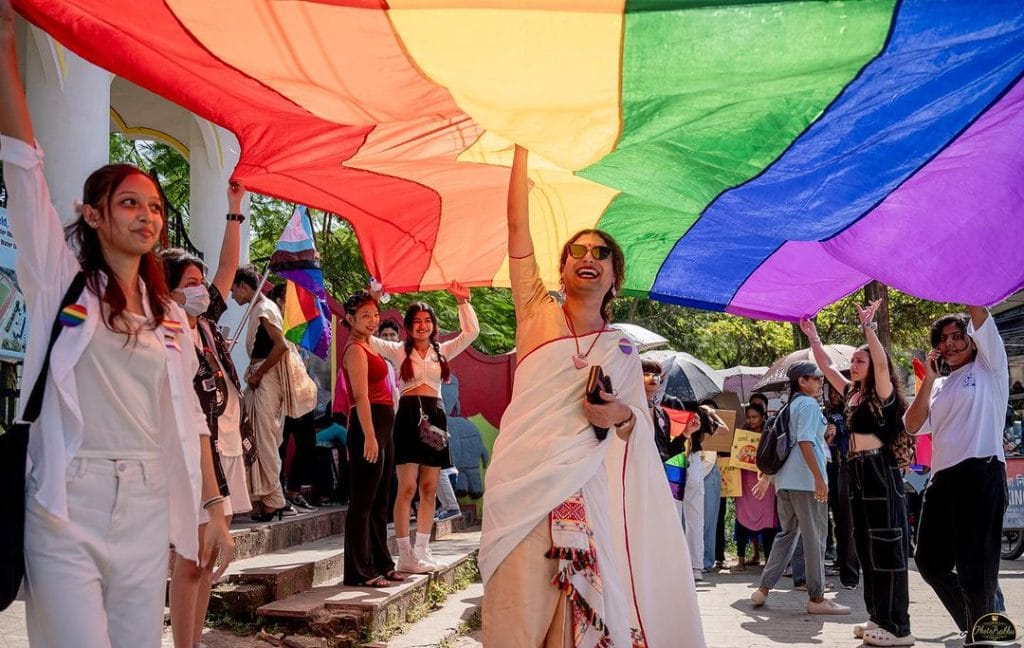
Another thing I have been working on is ensuring livelihood security for trans people — often workspaces are inaccessible to them and they face discrimination and sexual harassment within these spaces. They are often forced to take up unsafe or undignified jobs, so we need sustainable livelihood solutions for our community. Another aspect I am working towards is ensuring healthcare accessibility. For trans people, access to gender-affirming healthcare is a necessity, not a luxury. These are some of the issues I have been raising.
I really can’t say that I have seen any success because I have worked for a very short period. Government policies take time, but I am hoping for the best. In Assam, we have taken up some work around ensuring livelihoods. However, most of my work has been through my organisation. One thing the government has to do now is allocate resources. For example, there was a provision for a scholarship for transgender students from the Ministry of Social Justice and Empowerment, Government of India. If you visit the SMILE portal (National Portal for Transgender Persons), you’ll find that the last time this scholarship was provided was in 2022. Almost two years have passed since, which means they do not have the money for the scholarship and that the government has not been allocating funds. Most affirmative actions are being carried out by civil society organisations. The central and state governments need to allocate resources to make a difference.
FII: Recently through Queer Xanjug, Akam and Drishti have launched a nine-month queer leadership youth program. How do you think youth leadership will further the cause of the queer community in Assam?
Rituparna Neog: Affirmative action cannot be brought about by one or two persons or leaders. The feminist movement is all about reaching and engaging the maximum number of people. I believe young people have the potential to bring about change. This is why I started Queer Xanjug, which is a youth leadership program for queer people – to empower them to take action to ensure gender justice. We need more people working on the ground because no one can do everything on their own. The feminist way is to pass the mic and build a community of people who will take the cause forward.
About the author(s)
Madhusmita Mukherjee (she/they) is a queer feminist writer and photographer from Assam who is passionate about advocating gender equality and social justice. She completed her postgraduation in English from the University of Delhi (2022-24). Her academic interest lies in gender studies, media memory and cultural studies. Her recent publication features in the Zubaan anthology Riverside Stories: Writings from Assam edited by Banamallika.
